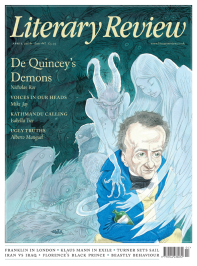Mike Jay
You Talking to Me?
The Voices Within: The History and Science of How We Talk to Ourselves
By Charles Fernyhough
Profile Books/The Wellcome Collection 319pp £16.99
‘Do you hear voices?’ It’s not always wise to answer in the affirmative. In a famous experiment in 1973, the Stanford psychologist David Rosenhan and seven other perfectly sane people requested admission to mental hospitals, claiming that they were hearing an inner voice saying ‘empty’, ‘hollow’ or ‘thud’. Seven of the eight participants were admitted, diagnosed with schizophrenia and released only after accepting the label.
In fact the great majority of us hear voices in our heads – when we read or write, when our mind wanders, as we drift off to sleep. As children we learn to speak by vocalising them, and inner monologues and dialogues become an essential part of thinking. As we discover when learning to meditate, it’s remarkably difficult to shut them up.
When Charles Fernyhough began studying inner voices twenty years ago, the field was relatively untilled. There was no clear methodology: such irreducibly subjective phenomena are impossible to verify, and even the best descriptions distort the original experience. In the interim he has dedicated himself to mapping the contours of his

Sign Up to our newsletter
Receive free articles, highlights from the archive, news, details of prizes, and much more.@Lit_Review
Follow Literary Review on Twitter
Twitter Feed
Under its longest-serving editor, Graydon Carter, Vanity Fair was that rare thing – a New York society magazine that published serious journalism.
@PeterPeteryork looks at what Carter got right.
Peter York - Deluxe Editions
Peter York: Deluxe Editions - When the Going Was Good: An Editor’s Adventures During the Last Golden Age of Magazines by Graydon Carter
literaryreview.co.uk
Henry James returned to America in 1904 with three objectives: to see his brother William, to deliver a series of lectures on Balzac, and to gather material for a pair of books about modern America.
Peter Rose follows James out west.
Peter Rose - The Restless Analyst
Peter Rose: The Restless Analyst - Henry James Comes Home: Rediscovering America in the Gilded Age by Peter Brooks...
literaryreview.co.uk
Vladimir Putin served his apprenticeship in the KGB toward the end of the Cold War, a period during which Western societies were infiltrated by so-called 'illegals'.
Piers Brendon examines how the culture of Soviet spycraft shaped his thinking.
Piers Brendon - Tinker, Tailor, Sleeper, Troll
Piers Brendon: Tinker, Tailor, Sleeper, Troll - The Illegals: Russia’s Most Audacious Spies and the Plot to Infiltrate the West by Shaun Walker
literaryreview.co.uk